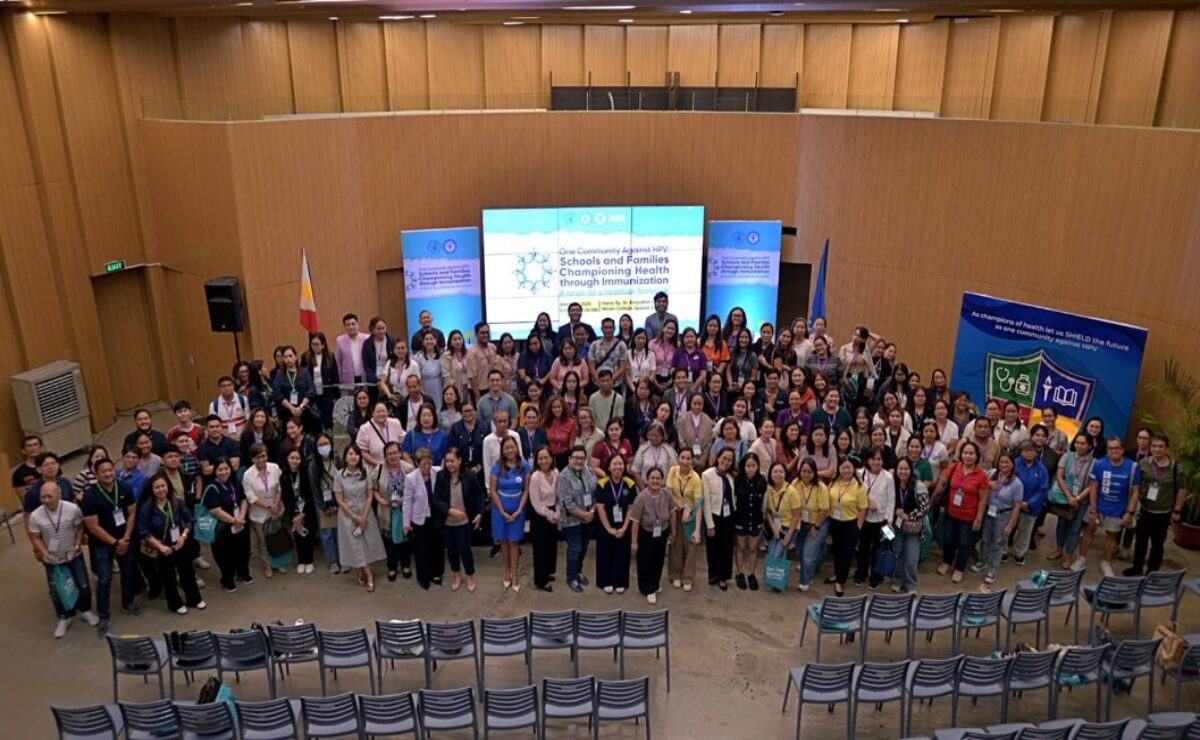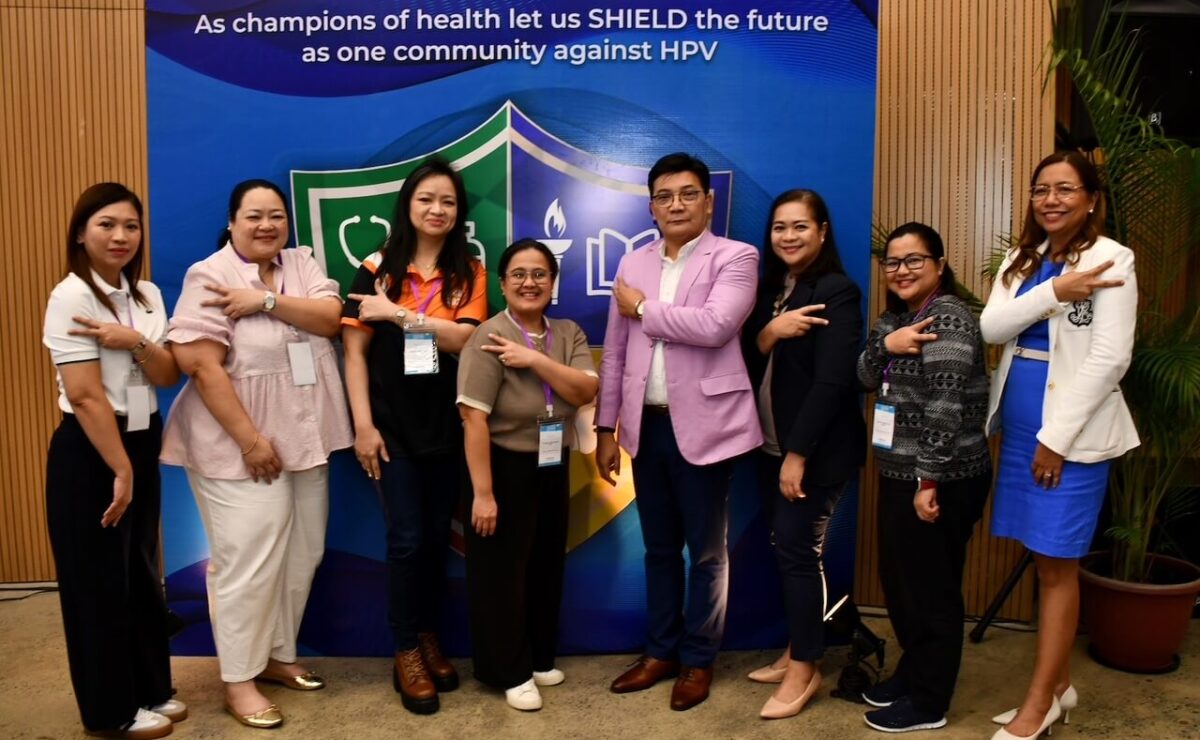Private schools step up: Strengthening HPV prevention through immunization
Miriam College and the Catholic Educators Association of the Philippines-National Capital Region (CEAP NCR) have taken a groundbreaking step in the fight against HPV by hosting the first-ever HPV Summit for Private Schools. The event, “One Community Against HPV: Schools and Families Championing Health Through Immunization,” brought together educators, parents, healthcare professionals, and policymakers to address the urgent need for HPV vaccination among school-aged children.

Representatives from Miriam College, CEAP NCR, private school representatives, and relevant agencies attended the first-ever HPV Summit for Private Schools on March 15. The summit aimed to unite educators, parents, and healthcare experts to champion HPV vaccination for school-aged children. #OneCommunityAgainstHPV
Expanding HPV Vaccination in Private Schools
While the Department of Health (DOH) and the Department of Education (DepEd) have long implemented school-based immunization programs in public schools, private institutions have had fewer opportunities to participate. The summit sought to close this gap by encouraging private schools to integrate HPV vaccination into their health programs, ensuring that all students—regardless of school type—are protected against HPV-related diseases.
“Investing in health is essential to the holistic development of society,” said Trixie Marie Sison, vice president for academic affairs at Miriam College. “By bringing together educators, healthcare providers, and community leaders, we are fostering a network of support that empowers women and girls to lead healthy, fulfilling lives.”
A Survivor’s Story: Why Prevention Matters
For Belay Fernando, an athlete and cervical cancer survivor, HPV vaccination is more than a medical recommendation—it is a lifesaving intervention.

(L-R) Belay Fernando dela Cruz, athlete and cervical cancer survivor; Dr. Martha Aguilar-Aquino, President, Philippine Infectious Disease Society of Obstetrics and Gynecology; Dr. Analyn Paterno, Treasurer, Philippine Academy for Physicians in School Health, Inc.; Dr. Maria Cristina Alberto, Board Member, Philippine Foundation for Vaccination, and Dr. Jill Estabillo, Grade 7 Parent Officer, Miriam College High School. Experts, advocates and parents took the stage at the HPV Summit’s panel discussion to share strategies for protecting young girls and women against cervical cancer. Committed to saving lives, they emphasized HPV vaccination as a key tool in prevention. #OneCommunityAgainstHPV
Her battle with cervical cancer began in 2018 with unusual symptoms that led to multiple misdiagnoses. By the time she received the correct diagnosis, the disease had progressed to stage 3B, requiring an intense treatment regimen that included 25 external radiation sessions, four brachytherapy sessions, and six rounds of chemotherapy. Even after completing treatment, the cancer persisted, forcing her to undergo additional rounds of chemotherapy for two more years.
Beyond the physical and emotional toll, the financial burden was immense, a reality that many Filipino families face. “Many Filipinas don’t have access to timely care,” Fernando emphasized, underscoring the importance of prevention through vaccination.
Determined to break the stigma surrounding cervical cancer, Fernando now actively advocates for open conversations about HPV, screening, and vaccination. “People associate cervical cancer with STDs, and that prevents women from speaking up. But awareness saves lives,” she said.
A Call to Action: The Fight Against Cervical Cancer
Cervical cancer remains one of the leading causes of cancer-related deaths among Filipinas, claiming 12 lives every day. HPV, a highly transmissible virus, is responsible for nearly all cervical cancer cases and is also linked to other cancers affecting both men and women.
Dr. Socorro Bernardino, trustee of the Philippine Obstetrical and Gynecological Society, stressed that HPV vaccination can prevent up to 90% of HPV-related cancers. However, despite the vaccine being available since 2006 and included in the National Immunization Program (NIP) since 2015, only 33% of eligible Filipina girls have completed the recommended two doses.
“The science is clear. This vaccine saves lives, yet many children remain unprotected due to misconceptions, community hesitancy, or lack of access,” said Dr. Migo Mantaring, Director, Bureau of Learner Support Services, Department of Education. “Schools play a critical role in ensuring children receive life-saving vaccines in a trusted environment.”
Strengthening Public-Private Partnerships

Educators, parents, and healthcare professionals stand united in advocating HPV vaccination, calling for a more comprehensive school-based immunization program to include private schools with the goal of protecting more children nationwide.
To institutionalize school-based health services, Mantaring announced that DepEd, DOH, and local government units (LGUs) are finalizing a joint administrative order to integrate school clinics into the local healthcare system. A School Health Benefit Package is also being developed in collaboration with PhilHealth, aiming to provide financial support for preventive health services, including immunization.
Mantaring also called on the private sector to expand HPV vaccination access through public-private partnerships. “We must work together—educators, health professionals, policymakers, and parents—to remove barriers to vaccination and ensure every child is protected,” he said.
Building a Future Free from HPV-Related Diseases
The World Health Organization (WHO) Global Strategy to Accelerate the Elimination of Cervical Cancer outlines three critical targets for 2030:
- 90% of girls fully vaccinated with the HPV vaccine by age 15
- 70% of women screened using a high-performance test by ages 35 and 45
- 90% of women diagnosed with cervical disease receiving treatment
Expanding HPV vaccination in private schools is a crucial step toward meeting these targets. By ensuring that students in private institutions are not left behind, stakeholders hope to bridge the immunization gap and prevent future cases of HPV-related cancers.
The summit emphasized the vital role of schools in shaping health behaviors, dispelling misinformation, and increasing vaccine access. It also marked an important milestone in the collaboration between schools, healthcare providers, and policymakers—a united effort to make HPV-related cancers a thing of the past.
ADVT.
This article is brought to you by HPV and fight against cervical cancer cancer.